Exploring the Role of Genetics in Cannabis Potency
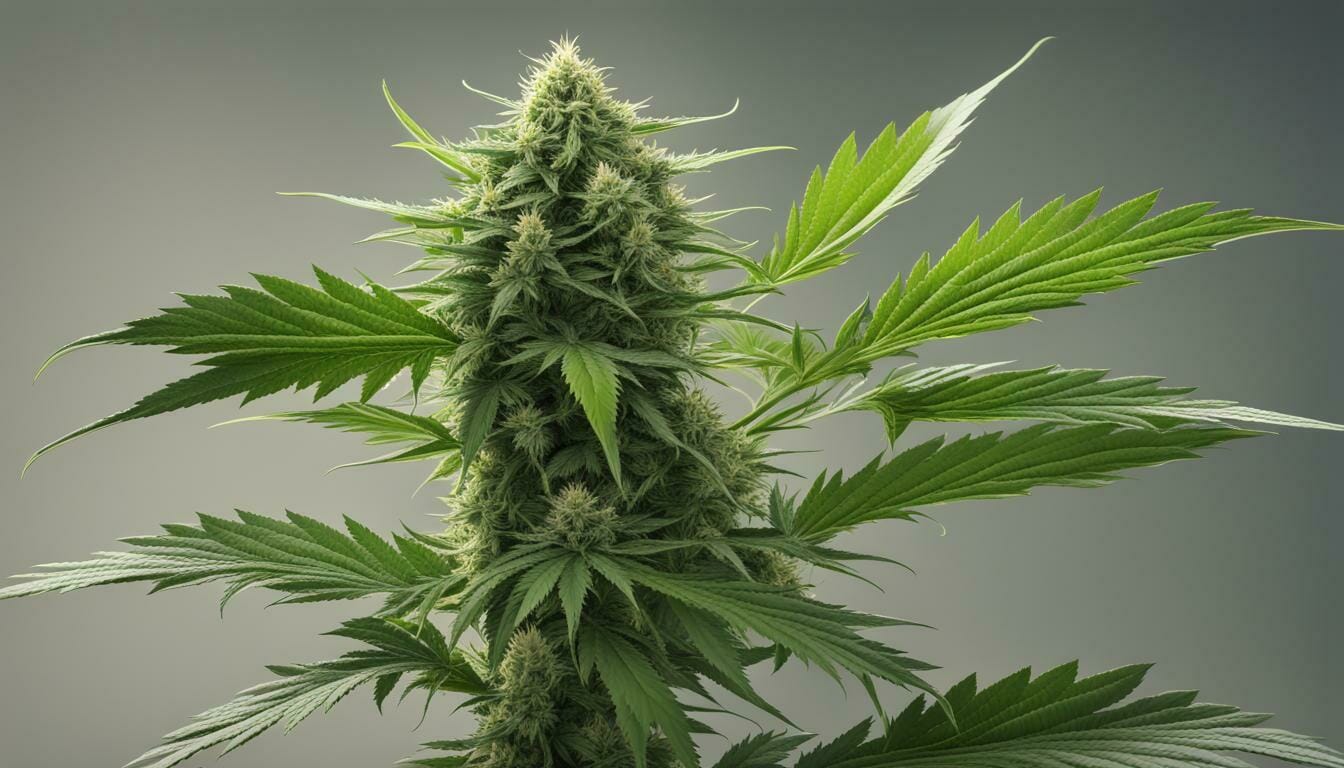
As the cannabis industry continues to grow, there is an increasing interest in understanding the factors that influence the strength and effect of different strains. One crucial factor that determines the potency of cannabis plants is genetics. Genetic variations can cause significant differences in the chemical composition of cannabis plants, resulting in varying levels of potency.
Key Takeaways:
- The potency of cannabis strains is determined by genetics.
- Genetic variations can result in varying levels of THC and CBD.
- Understanding genetic factors that influence cannabis potency is vital in breeding high-potency strains.
Understanding the Genetic Basis of Cannabis Strength
When it comes to cannabis potency, genetics play a critical role in determining the chemical composition of the plant. The genetic makeup of a cannabis strain can impact the levels of THC and CBD, resulting in varying degrees of potency. Identifying the genetic traits that contribute to cannabis strength is essential for creating high-potency strains that meet the demands of today’s cannabis market.
The genetic basis of cannabis strength is complex and multifaceted. Different genetic variations can lead to distinct chemical profiles in cannabis plants, resulting in varying levels of potency. Traits such as plant height, leaf size, and flowering time can all be affected by genetics. Additionally, genetic variations can impact the production of key compounds such as cannabinoids and terpenes, which directly contribute to the potency of the plant.
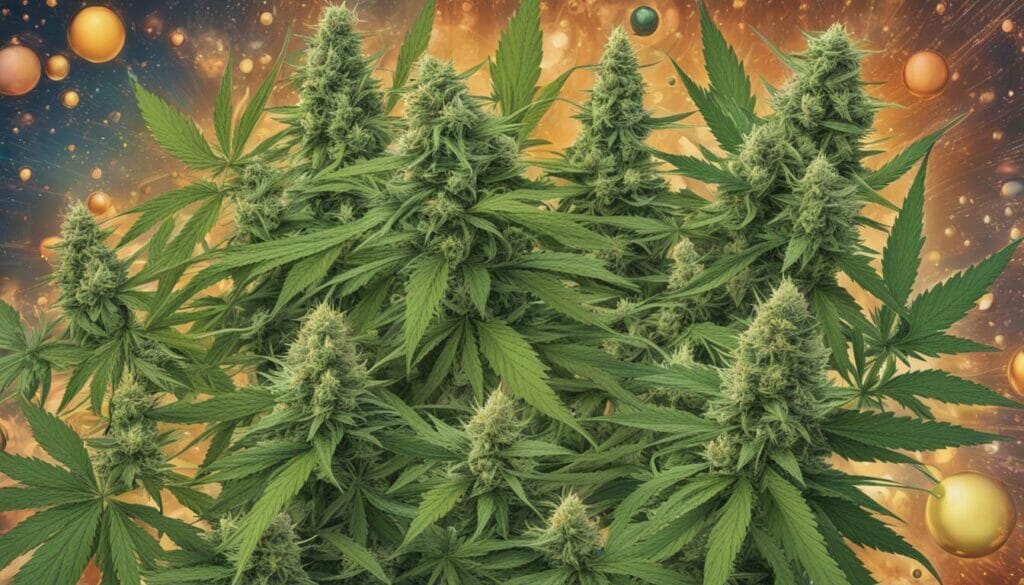
Recent research has identified several specific genetic traits that are associated with cannabis potency. For example, one study found that variations in a gene known as THCA synthase can impact the levels of THC produced by the plant. Other studies have identified genetic markers associated with CBD production, which can also impact the overall potency of the cannabis strain.
Understanding the genetic basis of cannabis strength is essential for developing high-potency strains that meet the demands of the cannabis market. By identifying specific genetic markers associated with potency, breeders can use selective breeding techniques to create strains with increased levels of desired compounds. This can result in stronger effects, more intense flavors, and overall better quality cannabis products.
Genetic Factors Influencing Cannabis Potency
The specific genetic makeup of a cannabis plant can greatly influence its potency. Variations in certain genes can affect the production of cannabinoids and other compounds that contribute to a strain’s strength and effects. Understanding these genetic factors is crucial for breeders who are looking to maximize potency and create new strains with desirable characteristics.
One important genetic factor that can influence cannabis potency is the level of THC synthase (THCA synthase) enzyme expression. This enzyme is responsible for the conversion of cannabigerolic acid (CBGA) into tetrahydrocannabinolic acid (THCA), which is then converted to THC through decarboxylation. Plants with higher levels of THCA synthase expression tend to produce higher levels of THC, resulting in stronger effects.
| Genetic Factor | Impact on Potency |
|---|---|
| THCA Synthase Expression | Higher expression results in higher THC levels and stronger effects |
| CBD Synthase Expression | Higher expression results in higher CBD levels and more balanced effects |
| Terpene Synthase Expression | Higher expression results in greater aroma and flavor complexity |
Another important genetic factor is the expression of cannabidiolic acid (CBDA) synthase, which affects the production of cannabidiol (CBD). Plants with higher levels of CBDA synthase expression tend to produce higher levels of CBD, resulting in more balanced effects. Other genetic variations can also impact the production of terpenes, which contribute to a strain’s aroma and flavor complexity.
It’s important to note that the interaction between genetic factors and environmental conditions can also play a significant role in determining a strain’s potency. However, by selecting for desired genetic traits through breeding programs and genetic testing, breeders can increase the likelihood of producing high-potency strains with predictable effects.

Genetic testing can identify specific genetic markers associated with high potency, allowing growers to select plants with desirable traits and consumers to choose strains with their preferred effects. As research in the field of cannabis genetics continues to evolve, breeders will be able to further maximize potency and create new strains that cater to the unique needs and preferences of consumers.
The Impact of Genetics on Cannabis Potency
Genetics have a direct impact on the final potency of cannabis strains. Different genetic variations can result in varying levels of THC and CBD, leading to stronger effects. For example, the popular strain OG Kush is known for its high THC content, which is due to genetic variations that promote THC production. On the other hand, strains with high CBD levels, such as Charlotte’s Web, also have genetic variations that promote CBD production.

Genetic testing can assist growers and consumers in selecting strains with desired potency levels. By identifying genetic markers associated with high potency, growers can select for these traits during breeding programs. Additionally, cannabis products can be tested for their genetic makeup, providing transparency for consumers and ensuring consistency in potency levels.
“Genetics have a direct impact on the final potency of cannabis strains.”
While environmental factors can also influence potency, it is clear that genetics play a crucial role. Understanding the genetic basis of cannabis strength can assist in developing high-potency strains with desirable characteristics. Continued research in this field, along with advancements in genetic engineering, can further enhance the potency of cannabis in the future.
Genetic Variation and Cannabis Potency
One of the fascinating aspects of genetic research is the concept of genetic variation. In cannabis, genetic variation refers to the differences in the genetic makeup of different strains. These differences can create significant variations in potency, flavor, and overall effect.
For example, some strains may have a higher THC content, resulting in stronger psychoactive effects, while others may have a higher CBD content, which can produce calming and relaxing effects. The combination of different genetic traits can result in a vast array of cannabis strains with varying characteristics.
| Genetic Variation and Cannabis Potency | Effects |
|---|---|
| High THC content | Strong psychoactive effects |
| High CBD content | Calming and relaxing effects |
| Combinations of THC and CBD | Mixed effects, depending on the ratio |
Genetic variation is essential in breeding programs as it allows breeders to select for desirable traits, creating new and more potent strains. However, it’s important to maintain genetic diversity to ensure that strains do not become too similar, reducing their overall genetic fitness.
Understanding genetic variation is, therefore, critical in maximizing cannabis potency and developing new strains that meet the needs of growers and consumers.

Genetics vs. Environmental Factors in Cannabis Potency
When it comes to determining cannabis potency, genetics and environmental factors both play important roles. However, the extent to which each influences potency can vary depending on the strain and growing conditions.
Genetics provide the foundation for a strain’s chemical composition and potential potency. Certain genetic variations can result in higher levels of THC or CBD, leading to stronger effects. However, environmental factors such as light, temperature, and humidity can also impact potency by affecting the plant’s growth and chemical production.
It’s important to note that genetics and environmental factors do not exist in isolation when it comes to cannabis potency. Rather, they interact in complex ways to shape the final product. For example, a strain with strong genetic predispositions for potency may not reach its full potential if grown in suboptimal conditions. Conversely, a strain with weaker genetic predispositions may still produce potent buds if grown in ideal conditions.
Ultimately, both genetics and environmental factors need to be carefully considered and managed in order to maximize cannabis potency. Breeders can select strains with desired genetic traits and cultivate them under optimal growing conditions to create high-potency strains. Similarly, growers can fine-tune environmental factors to enhance the potency of their crops.
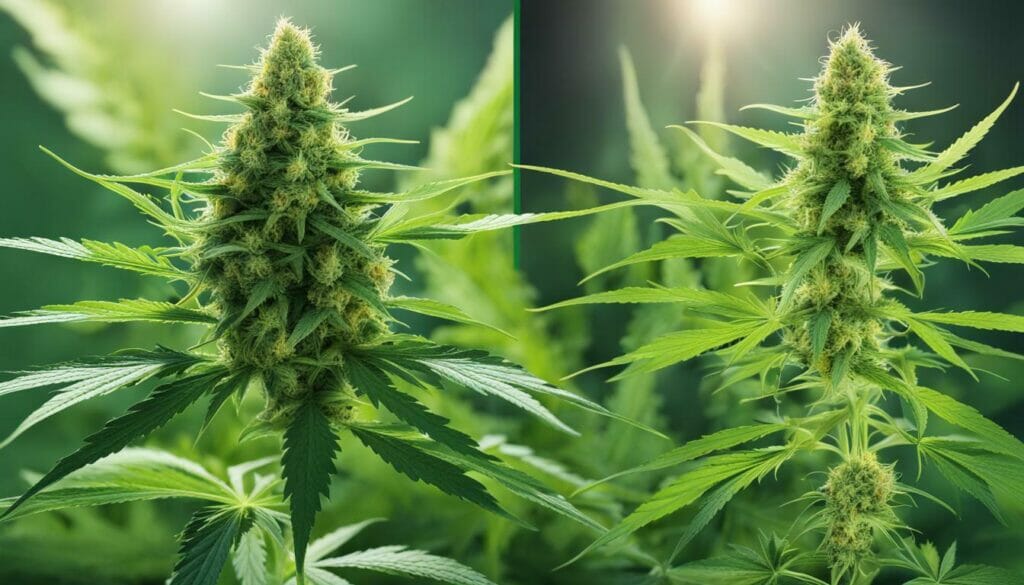
“Genetics provide the foundation for a strain’s chemical composition and potential potency. However, environmental factors such as light, temperature, and humidity can also impact potency by affecting the plant’s growth and chemical production.”
The Role of Breeders in Maximizing Cannabis Potency
When it comes to achieving high-potency cannabis strains, breeders play a crucial role in the process. By utilizing genetic selection and crossbreeding techniques, breeders can develop new strains with desirable potency profiles. This not only benefits growers and consumers, but it also contributes to the overall advancement of the cannabis industry.
One of the most important aspects of breeding for potency is selecting for desirable genetic traits. Through careful observation and testing, breeders can identify specific genes that contribute to the production of cannabinoids and other compounds associated with potency. They can then use this information to selectively breed plants that exhibit desirable potency characteristics.
Reputable breeders have made significant contributions to the industry by developing some of the most popular and potent strains available today. For example, the well-known strain “Girl Scout Cookies” was created by crossing the strains Durban Poison and OG Kush. The result was a strain with a high THC content and a distinct flavor profile that has gained a cult following among cannabis enthusiasts.
| Breeders: | Responsible for developing high-potency strains through genetic selection and crossbreeding techniques. |
|---|---|
| Genetic Traits: | Identifying specific genes that contribute to the production of cannabinoids and other compounds associated with potency. |
| Popular Strains: | “Girl Scout Cookies” is a prime example of a popular and potent strain developed through selective breeding. |
The role of breeders in maximizing cannabis potency cannot be overstated. By utilizing their expertise in genetics and breeding techniques, they are able to create new strains with higher potency levels and unique flavor profiles. This benefits both growers and consumers, who are constantly seeking out new and potent strains to satisfy their needs.
Next up in this article, we’ll take a closer look at genetic testing for cannabis potency and how it can assist growers and consumers in selecting the right strains.
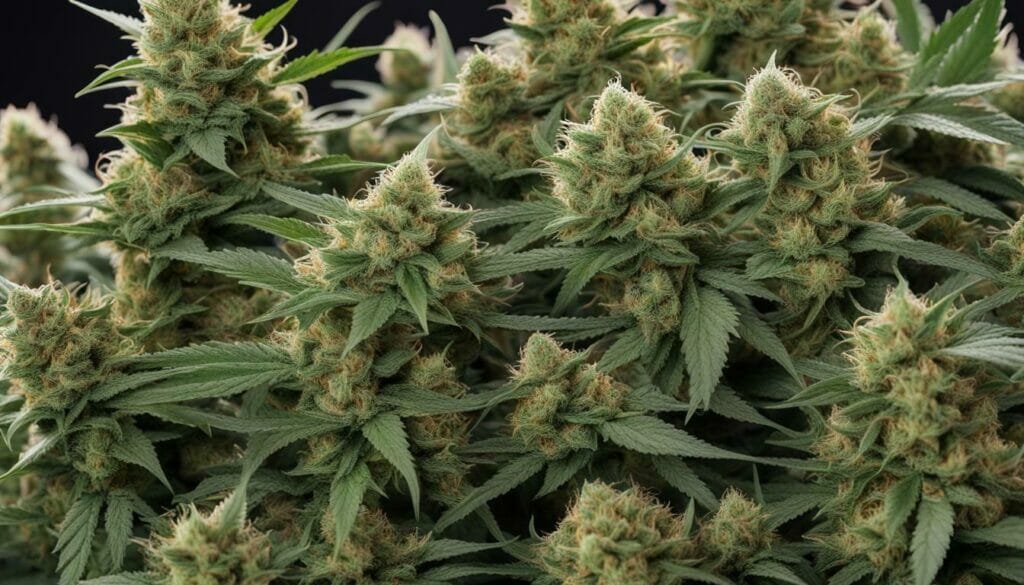
Genetic Testing for Cannabis Potency
Genetic testing is a powerful tool that can assist growers and consumers in selecting cannabis strains with desired potency levels. By analyzing the genetic makeup of different strains, genetic testing can identify specific genetic markers associated with high potency.
This type of testing involves taking a small sample from a cannabis plant and analyzing its DNA. The results can provide valuable insights into the genetic factors influencing potency, allowing growers to optimize their breeding programs and develop high-potency strains.
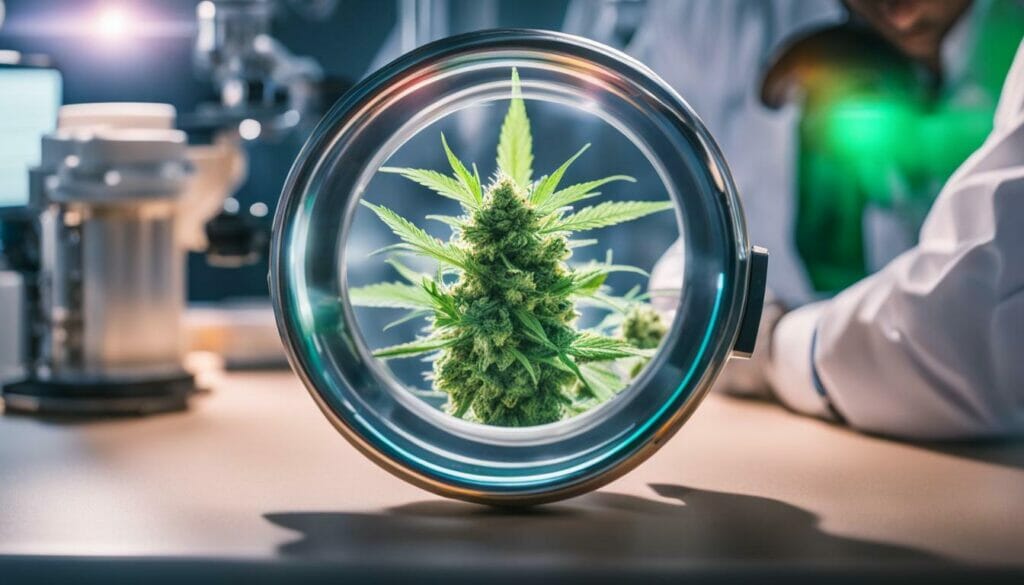
One example of genetic testing for cannabis potency is the StrainSEEK™ platform offered by Medicinal Genomics. This platform uses DNA sequencing to analyze the genetic makeup of cannabis strains, providing growers with valuable information about their plants.
In addition to assisting growers, genetic testing can also benefit consumers by helping them select strains that meet their desired potency levels. By examining the genetic makeup of different strains, consumers can identify those with high levels of THC or CBD, allowing them to tailor their cannabis experience to their specific needs.
As genetic testing technology continues to advance, its potential to enhance the cannabis industry will only continue to grow. By providing valuable insights into the genetic basis of cannabis potency, genetic testing can help growers and consumers maximize the benefits of this versatile plant.
The Future of Cannabis Potency Research
The study of genetics in relation to cannabis potency is an expanding field, with much potential for future research and discovery. New technologies and techniques are emerging that can enhance our understanding of the genetic basis of cannabis strength and contribute to the development of high-potency strains.
One such technology is CRISPR-Cas9, a gene-editing tool that can modify specific genes to produce desired traits. This technology holds immense promise for the cannabis industry, as it could potentially allow breeders to enhance desired genetic traits and create new, high-potency strains.
Another area of potential growth is the analysis of terpenes, aromatic compounds found in cannabis that contribute to the flavor and effect of different strains. By analyzing the genetic basis of terpene production, researchers may be able to develop strains with targeted flavor and aroma profiles, in addition to high potency.
Overall, the future of cannabis potency research is exciting and full of potential. As the industry continues to grow and develop, so too will our understanding of the genetic factors that contribute to cannabis potency.
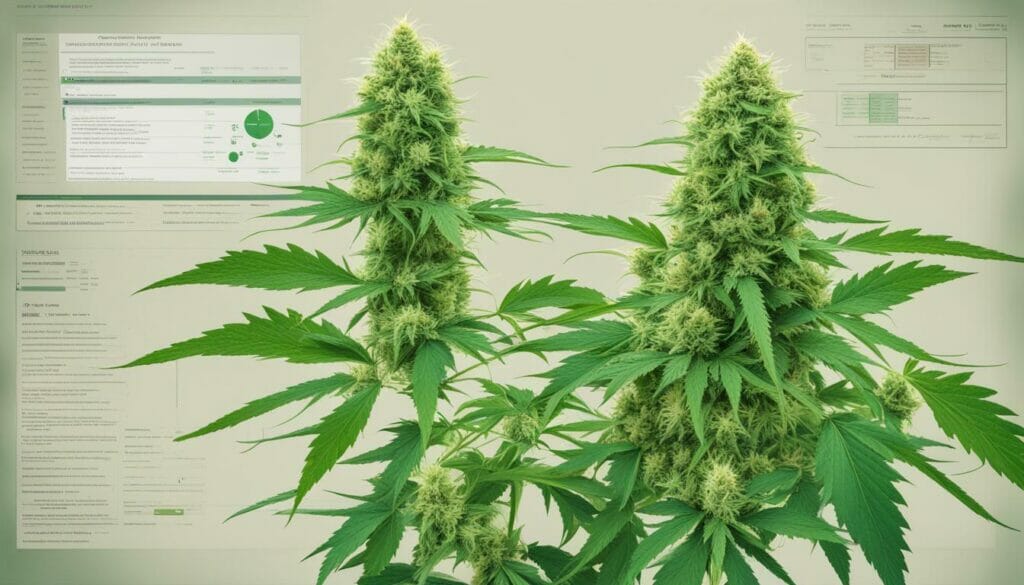
The Role of Genetics in Cannabis Potency – Real-world Examples
Now that we’ve explored the genetic basis of cannabis strength and the factors that influence potency, it’s time to take a closer look at some real-world examples of high-potency strains and the genetics behind them.
One well-known strain with a potent reputation is OG Kush, which is believed to be a cross between Chemdawg and Hindu Kush. This strain is known for its high THC content, which can exceed 20%. Its genetics likely play a role in its potency, as Chemdawg is a potent strain known for its intense cerebral effects and Hindu Kush is a landrace strain known for its high resin production.
Another potent strain is Girl Scout Cookies, which is a hybrid of Durban Poison and OG Kush. This strain is famous for its sweet, earthy aroma and potent effects, which can reach THC levels of 28%. Its genetics likely contribute to its high potency, as Durban Poison is a potent sativa strain known for its uplifting effects and OG Kush is known for its high THC content.
Finally, there is Blue Dream, which is a hybrid of Blueberry and Haze. This strain is known for its balanced effects and sweet, berry flavor. Its potency can reach 26% THC. Its genetics likely play a role in its potency and flavor, as Blueberry is known for its sweet, fruity flavor and Haze is known for its potent sativa effects.
These examples demonstrate the importance of genetics in determining cannabis potency and flavor. By understanding the genetic characteristics of different strains, breeders can develop high-potency strains that meet the demands of consumers.
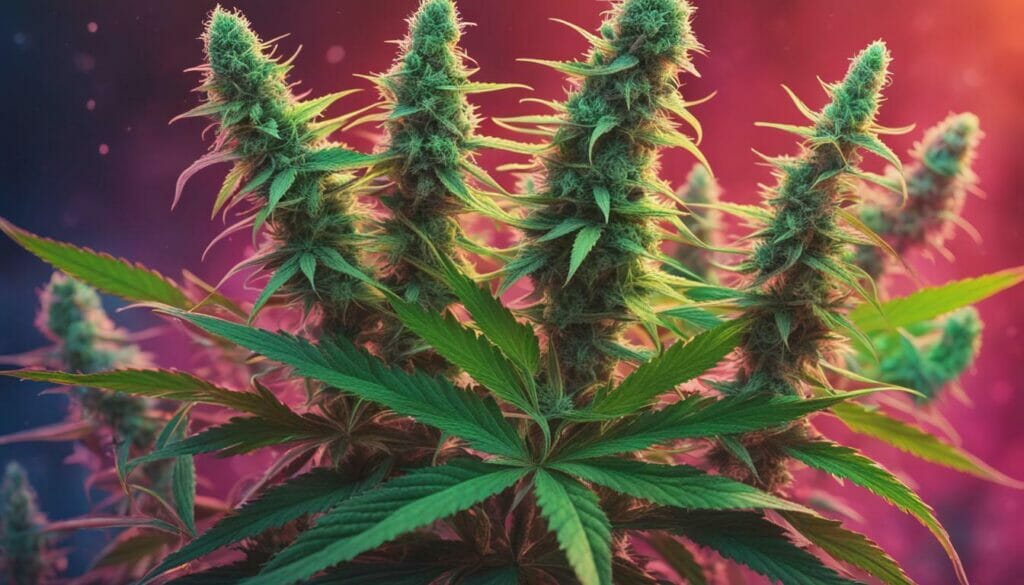
The Role of Genetics in Cannabis Potency – Real-world Examples
Real-world examples are the perfect way to showcase how genetics influence the potency of cannabis. For instance, the strain OG Kush is one of the most popular strains due to its high THC content, which accounts for its strong effects. This strain is a hybrid of two potent strains, Chemdawg and Hindu Kush, which are known for their high THC levels.
Another example is the strain Girl Scout Cookies, which is also known for its high THC content and intense effects. The strain is a cross between two different strains, Durban Poison and OG Kush, both of which are known for their potent effects.
Additionally, the strain Blue Dream is a hybrid of the Blueberry and Haze strains, which produce strong effects due to their high THC content. It’s important to note that each of these strains has a unique genetic profile that contributes to its potency and overall effect.
Overall, these real-world examples highlight the significant impact that genetics have on the potency of cannabis. By understanding the genetics of different strains, breeders can create new strains with desired potency and effect profiles that consumers seek.
The Importance of Genetics in Cannabis Potency
Genetics plays a significant role in determining the potency and effect of different cannabis strains. By understanding the specific genetic traits that contribute to potency and effect, breeders can create strains that meet the demands and needs of consumers. Through genetic testing and breeding programs, the cannabis industry can continue to develop high-potency strains that deliver the desired effects.
It’s crucial to have a comprehensive understanding of the genetics of cannabis potency, as it assists in the production of strains that cater to specific medicinal and recreational needs. It also provides growers with the ability to maximize the production of high-potency plants, ensuring financial success in the industry.
Conclusion
The role of genetics in cannabis potency cannot be underestimated. Understanding the genetic basis of cannabis strength and genetic factors influencing cannabis potency is essential for the production of potent strains. The industry’s continued research in this field is crucial for the development of new strains that meet various medicinal and recreational needs.
As the industry continues to grow and evolve, the importance of genetics in determining cannabis potency will only continue to increase. By leveraging the latest gene editing and crossbreeding techniques, breeders will be able to produce strains tailored to individual consumer preferences, ensuring the continued success of the cannabis industry.
FAQ
Q: What is the role of genetics in cannabis potency?
A: Genetics play a crucial role in determining the potency of cannabis plants. Different genetic variations can result in varying levels of potency, including the levels of THC and CBD.
Q: How do genetics influence cannabis strength?
A: Genetics determine the chemical composition of cannabis plants, including the levels of THC and CBD. Certain genetic variations may result in higher levels of these compounds, leading to stronger effects.
Q: What are the genetic factors that influence cannabis potency?
A: Variations in specific genes can affect the production of cannabinoids and other compounds that contribute to potency. Breeding programs focus on selecting for desired genetic traits to enhance potency.
Q: How does genetics impact the final potency of cannabis strains?
A: Genetics can have a direct impact on the final potency of cannabis strains. Certain genetic variations may result in higher levels of THC or CBD, leading to stronger effects. Genetic testing plays a significant role in the cannabis industry.
Q: What is genetic variation and how does it affect cannabis potency?
A: Genetic variation refers to different combinations of genetic traits that can result in variations in potency, flavor, and overall effect. Genetic diversity is important in breeding programs to develop strains with desired characteristics.
Q: How do genetics compare to environmental factors in determining cannabis potency?
A: Genetics and environmental factors both contribute to determining cannabis potency. Genetic predispositions interact with environmental conditions to shape the final potency of a strain. Genetic modifications can enhance desired traits.
Q: What is the role of breeders in maximizing cannabis potency?
A: Breeders play a crucial role in maximizing cannabis potency. They utilize genetic selection and crossbreeding techniques to develop high-potency strains. Reputable breeders have made significant contributions to the industry.
Q: How does genetic testing work for cannabis potency?
A: Genetic testing can identify genetic markers associated with high potency in cannabis plants. This information can assist growers and consumers in selecting strains with desired potency levels.
Q: What is the future of cannabis potency research?
A: Ongoing and future research in the field of cannabis potency genetics aims to enhance our understanding of the genetic basis of cannabis strength. Emerging technologies and genetic engineering have the potential to further enhance potency.
Q: Can you provide real-world examples of how genetics influence cannabis potency?
A: There are well-known strains with distinct potency profiles that showcase the influence of genetics. These strains have specific genetic characteristics that contribute to their strength. Potent cannabis strains are highly sought after.
Suggested Articles
;)
;)
;)



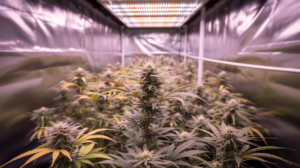
 08 Jul 2025
08 Jul 2025  4 min read
4 min read


 December 18, 2023
December 18, 2023 


RESPONSES (0)
No responses yet. Be the first to respond!